Shark Diving in Australia
Are you planning a trip to Australia’s Great Barrier Reef and are concerned about sharks? Or perhaps you’re wondering where to go shark diving in Australia or what to do if you come across a shark while snorkelling or scuba diving on the Great Barrier Reef? Well, knowledge is power, and we want to help you learn more if you have any questions about encountering a shark while snorkelling or scuba diving on Australia’s Great Barrier Reef.
We will cover what kind of sharks that can be found on the Great Barrier Reef most frequently, as well as whether they are dangerous to people and how likely it is that you will see one.
We love sharks and you should too.
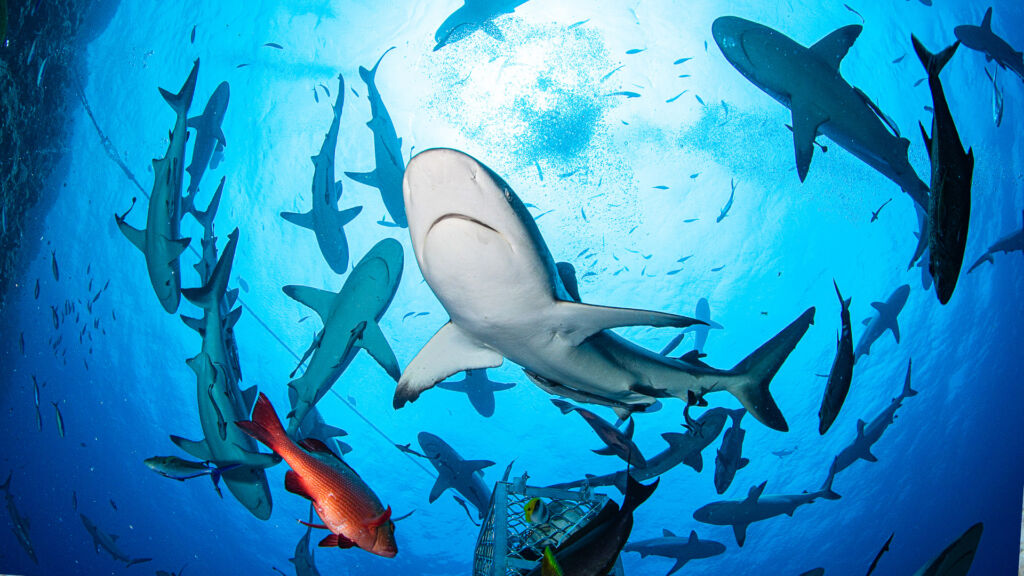
How can you help protect sharks on the Great Barrier Reef?
The sharks of the world are quickly becoming endangered, and some are even in threat of extinction. It’s estimated that some 100 million sharks are killed are killed for meat, as byproducts of commercial fishing, pollution, and out of fear.
As the apex predators, sharks play an important role in the food chain and keep things in balance. Put simply, without sharks the environmental consequences would be massive. So it is crucial that we do everything we can to support conservation and protect sharks from extinction.
Shark diving Australia is a great way to help support local conservation efforts and on every trip we collect data to help monitor and the shark population on the Great Barrier Reef and Coral Sea Australia. You can also help protect the sharks by avoiding souvenir shops and restaurants that sell shark products. You can learn more about Australian sharks and how you can help protect them at www.marineconservation.org.au/save-our-sharks/
What kind of sharks live on the Great Barrier Reef?
The Great Barrier Reef is home to over 134 different shark species and those that call the reef home are mostly harmless to people. White tip and black tip reef sharks are the most frequent sharks seen on the Reef. Grey reef sharks, leopard sharks, epaulette sharks, and wobbegong sharks can also be found around the Reef, although less commonly sighted. These sharks are usually harmless to humans unless they are deliberately provoked, such as by feeding them, grabbing their fins, or fishing when they are present.
There are a few additional sharks that live in the warmer waters of the Great Barrier Reef that can pose a greater hazard to people, but they are less frequently found in that area. Oceanic White Tips are not commonly seen on the Great Barrier Reef; instead, they prefer the deeper waters of the Coral Sea. Tiger Sharks, bigger grey sharks with tiger-like patterns on the sides of their bodies, are scavengers by nature and are rarely seen by snorkelers and divers in the Great Barrier Reef. Bronze Whalers are fast-moving sharks that are typically smaller than Tiger or Oceanic White Tip sharks, who can be very inquisitive and can pose a danger to fishers.
In general, most of the reef-dwelling sharks won’t bother you while you are snorkelling or scuba diving on the Great Barrier Reef. Sighting a shark can be a highlight of any snorkelling or scuba diving trip. Check out our 4-night dive liveaboard trip for your chance to go shark diving.
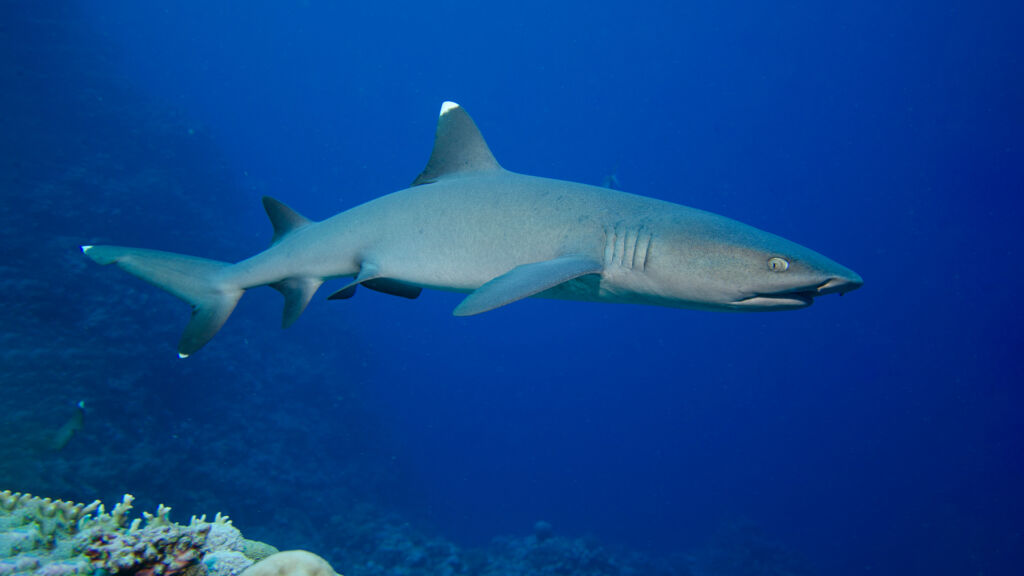
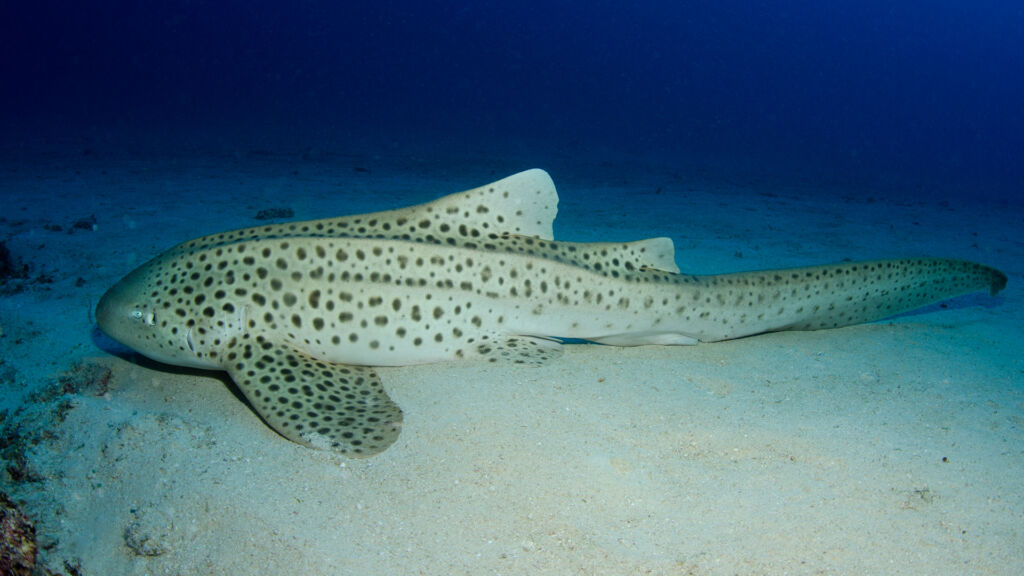
Do shark attacks happen in Australia?
Yes, incidents including sharks can happen in Australia – about three or four times a year, according to the statistic available. However, they very rarely occur in Queensland and are even less likely to occur on the Great Barrier Reef. To explain this, here are the most common reason sharks bite humans and often its a combination of several factors:
- Mistaken Identity – from below, the silhouette of a swimmer or surfer looks very similar shape and size of a sea lion.
- Poor Visibility – murky, choppy water make it difficult for a shark to see / smell and identify its prey.
- Time of Day – sharks are most active at sunset, sunrise and at night time.
- Location / Shared Habitat – River mouths have poor visibility and are often an ideal place for sharks to find food. Some sharks such as the Bull Shark can inhabit places where humans are also present, such as canals, estuaries and rivers. Simply by sharing the same environment – we are more at risk of an accidental bite. Even more so, considering the poor visibility and silty water conditions often found in rivers.
- Fishing / Fish Schools – large schools of baitfish will attract larger fish which in turn attract sharks. Similarly, areas where fish are being caught and cleaned.
Over the past 20 years, just 3 shark species have been responsible for fatal incidents in Australia – the Great White, Tiger and Bull sharks.
Shark Diving Australia Safety
Diver safety is our number one priority on Spirit of Freedom and guests are fully briefed before shark diving on our Australian liveaboard dive trips.
Divers receive a safety presentation to ensure they understand the risks involved with shark diving, that they can identify shark behaviour and how to respond to a range of situations to ensure a safe dive. The shark diving attraction on our Coral Sea trips requires an advanced skill level.
Our highly skilled crew are on hand throughout the experience to ensure guest safety at all times.
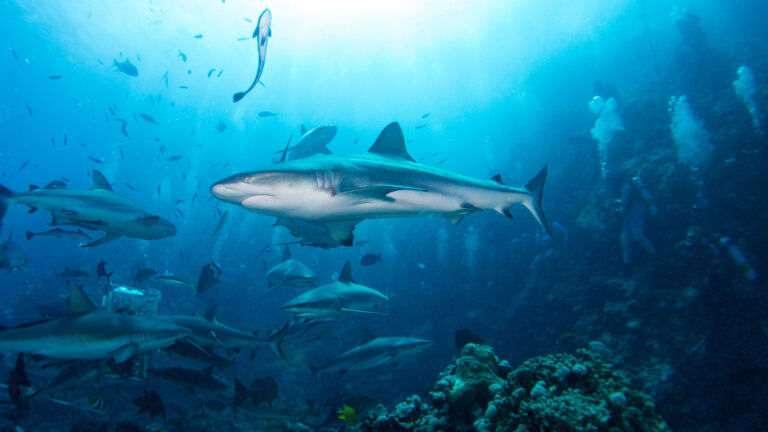
What should you do if you come across a shark when diving or snorkelling on the Great Barrier Reef?
In short, be calm, take it slow and enjoy. If you see a shark while snorkelling or diving you are more likely to see a white tip or black tip reef shark. They are generally smaller than humans and are easily scared away. If you have a camera, keep a respectful distance and snap a photo to share with the other snorkelers and divers when you return to the boat and to share your shark diving Australia experience with family and friends back home.
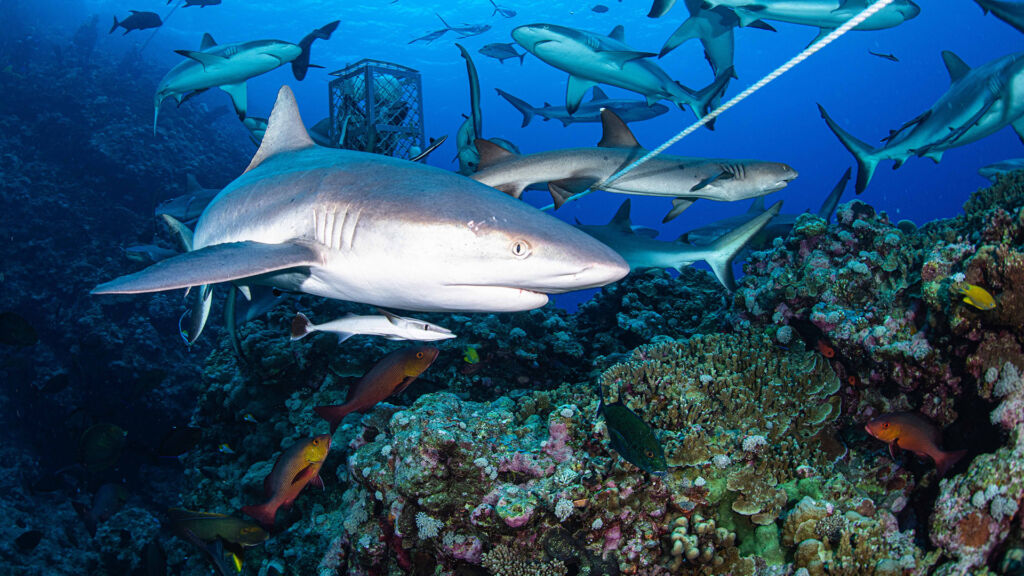
Learn more about shark conservation around the world – https://www.fisheries.noaa.gov/international-affairs/shark-conservation